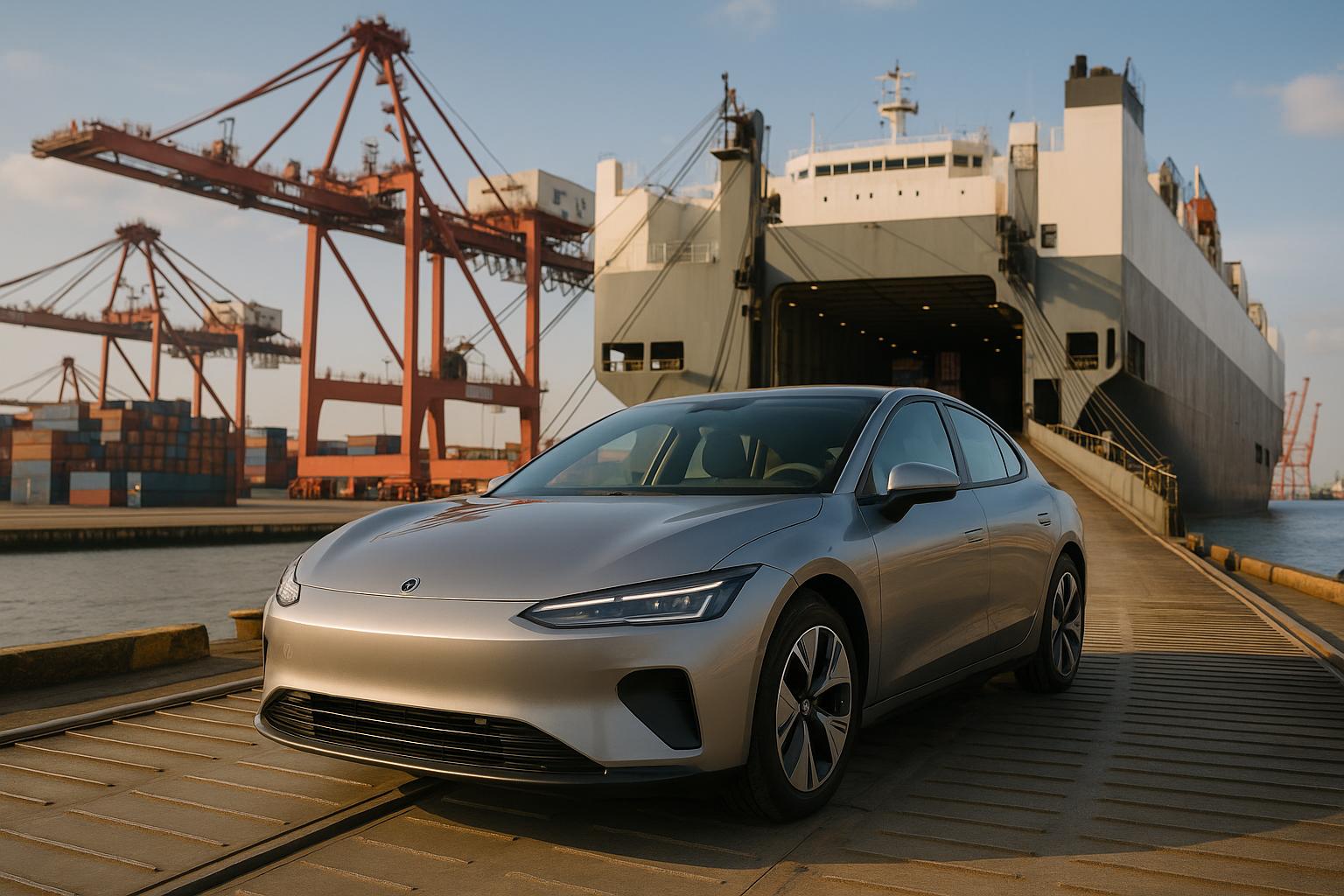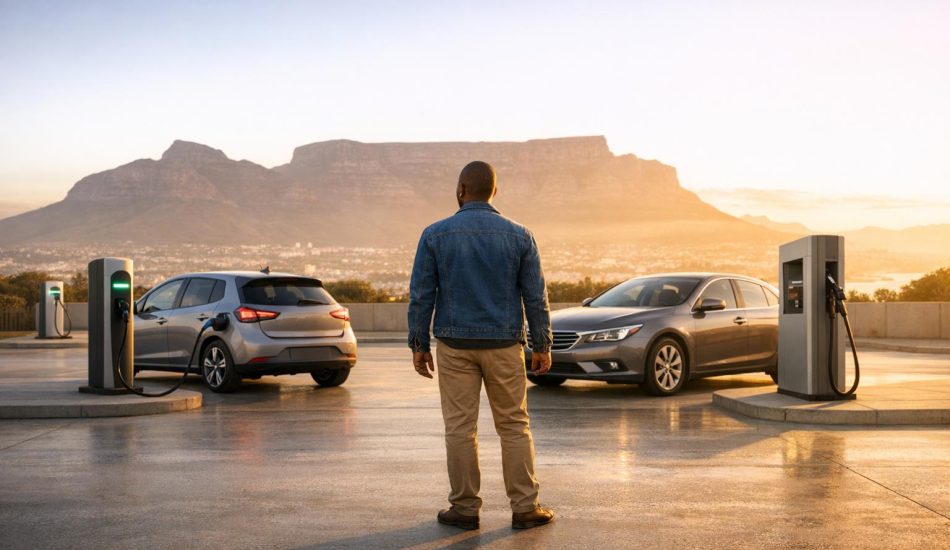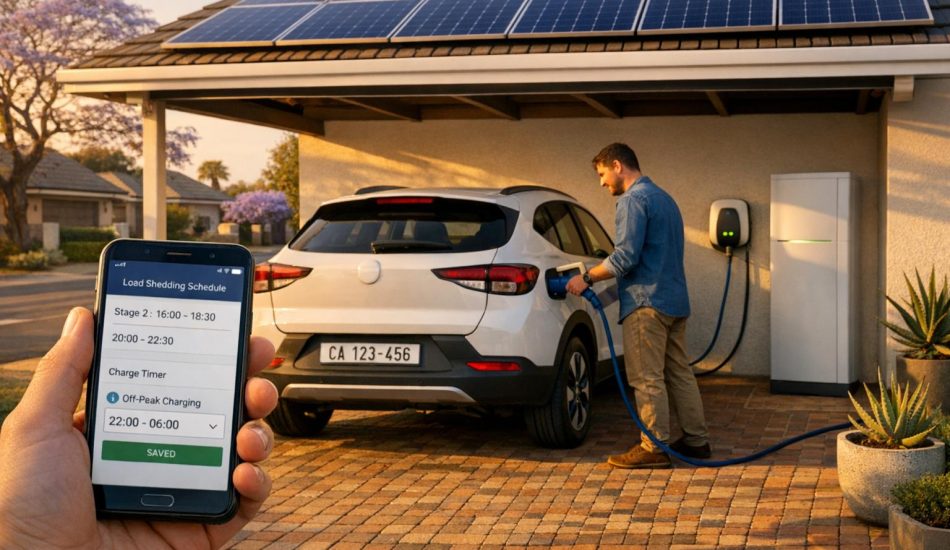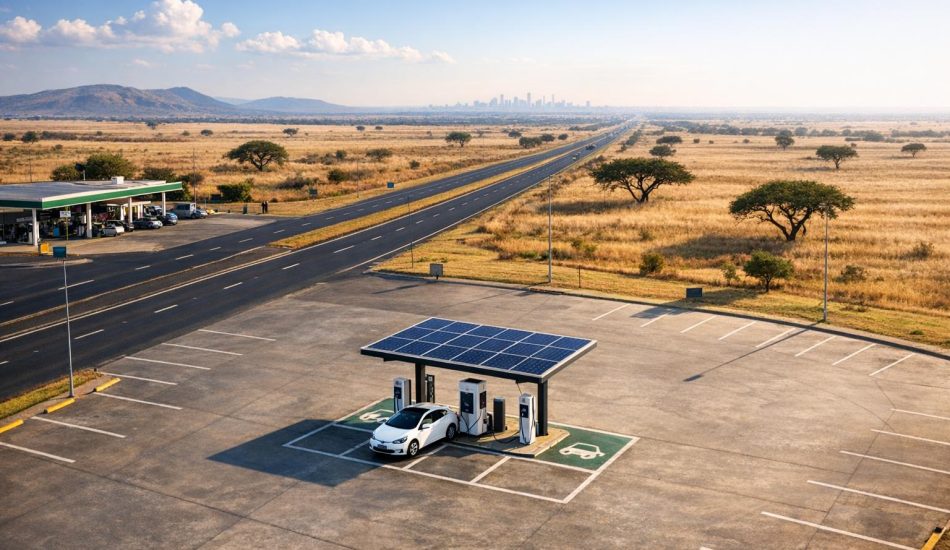
Want to import an electric car from China to Kenya in 2025? Here’s what you need to know:
- Kenyan EV Policies: Kenya offers reduced import duties and tax incentives to encourage EV adoption. EVs are taxed at a 10% excise duty and 25% import duty – lower than gasoline cars.
- Vehicle Requirements: EVs must be under 8 years old, meet Kenyan Bureau of Standards (KEBS) regulations, and have at least 80% battery health.
- Documents Needed: Prepare a Certificate of Conformity (COC), Pre-Export Verification of Conformity (PVOC), Import Declaration Form (IDF), and tax payment receipts.
- Top Chinese EV Brands: BYD, Leapmotor, Dongfeng, and Geely offer models with ranges from 340 km to 636 km, priced between $11,800 and $31,300.
- Shipping & Customs: Use trusted shipping providers familiar with EVs, ensure proper documentation, and complete pre- and post-shipment inspections.
Quick Tip: Platforms like EV24.africa can simplify the process by handling inspections, logistics, and compliance.
Why It Matters: With Kenya aiming for 16,000 EV imports annually, now is a great time to switch to cleaner transportation options. Lower costs, reduced emissions, and government incentives make importing EVs a practical choice.
Chinese EVs You Can Buy in Kenya – Africa EV Show
Import Rules and Requirements for Electric Vehicles in Kenya
If you’re planning to import an electric vehicle (EV) from China to Kenya, it’s important to familiarize yourself with the country’s import regulations. Kenya enforces specific standards and documentation requirements to ensure smooth customs clearance and legal registration. Let’s break down the essential details, including vehicle standards, necessary paperwork, and pre-export inspections.
Vehicle Requirements and Standards
Kenya has clear guidelines for imported vehicles to ensure they are safe and compatible with local infrastructure. For used electric vehicles, they must be less than 8 years old from the date of manufacture. Battery health is a key factor – used EVs are required to have at least 80% of their original battery capacity. While right-hand drive vehicles are better suited for Kenyan roads, left-hand drive models are also permitted without restrictions.
All EVs must meet the Kenya Bureau of Standards (KEBS) regulations, covering emissions and safety standards. Additionally, all technical specifications and measurements must adhere to the metric system. Ensuring that your vehicle complies with these standards is essential to avoid delays or penalties.
Required Documents
You’ll need to prepare two main sets of documents: one for pre-shipment certifications and another for customs clearance.
For pre-shipment certification, securing a KEBS-approved Certificate of Conformity (COC) is mandatory. This document confirms that your vehicle complies with Kenyan standards, and failure to obtain it could result in fines or even denial of entry. Another critical document is the Pre-Export Verification of Conformity (PVOC) Certificate, which acts as proof of roadworthiness and compliance with Kenyan regulations. Additionally, a proforma invoice is necessary for the Kenya Revenue Authority to calculate applicable taxes. Depending on your circumstances, you may also need an import license or forex allocation permit.
When your vehicle arrives at the Port of Mombasa, you’ll need the following for customs clearance:
- Original bill of lading
- Commercial invoice
- Import Declaration Form (IDF)
- Tax payment receipts as proof of duty and tax payments
The original logbook from China must also be canceled in the country of origin to comply with National Transport and Safety Authority (NTSA) requirements for issuing a Kenyan logbook. Individual importers should provide a copy of their PIN certificate, while companies must submit their certificate of incorporation along with a PIN certificate.
Pre-Export Inspection and Certificates
Before shipping, a pre-shipment inspection is required to obtain the PVOC Certificate, which ensures your EV meets Kenyan standards. This inspection, conducted by a KEBS-approved agent in China, focuses on key aspects like safety features, emissions compliance, and battery condition. The vehicle must also meet the age and technical requirements outlined by Kenyan regulations.
This inspection process not only confirms compliance but also prevents potential issues during customs clearance. Once completed, it streamlines the registration process and ensures your EV is ready for use in Kenya. By following these steps, you can avoid unnecessary complications and ensure a hassle-free import experience.
Import Costs, Taxes, and Government Incentives
Once regulatory compliance is sorted, the next step is tackling the financial side of importing an electric vehicle (EV). This includes accounting for duties, taxes, and fees. Fortunately, Kenya has policies in place to encourage EV adoption, which can help lower the overall costs compared to traditional gasoline-powered vehicles.
Import Duties and Tax Calculations
When bringing an EV into Kenya, duties and taxes are calculated based on the vehicle’s assessed market value. The good news? EVs often attract lower excise and import duty rates compared to their gasoline counterparts. After these duties are applied, a Value Added Tax (VAT) is charged on the total value, which includes both the import and excise duties.
On top of that, there are other fees to consider, such as declaration fees and levies tied to the shipment’s cost, insurance, and freight (CIF) value. Importers should also budget for additional expenses like port handling charges, customs agent fees, and the cost of transporting the vehicle from the port to its final destination.
Tax Benefits for Electric Vehicles
To promote EV adoption, Kenyan authorities have introduced several tax incentives. For instance, lower excise duty rates help reduce the overall tax burden on EVs. In some cases, import duties may even be reduced or waived for components like batteries or charging equipment when imported separately.
There are also incentives for setting up EV infrastructure. For example, certain investments in charging equipment may qualify for zero-rated VAT, making it cheaper to establish the necessary support systems for EVs. Businesses transitioning to electric fleets may also benefit from favorable depreciation allowances, which can improve the financial viability of their investment.
Cost Comparison: Electric vs. Gasoline Vehicles
While the exact tax rates and fees depend on the specific vehicle model and current regulations, EVs generally enjoy a more favorable tax structure than gasoline vehicles. Beyond the upfront savings, EVs often prove to be more economical over time due to lower fueling and maintenance costs.
Adding to the appeal, Kenyan financial institutions are now offering competitive financing options for EVs. Since terms and rates can vary, it’s a good idea to confirm the latest details with the relevant authorities or consult a specialized import agent. Next, we’ll explore the logistical steps and quality checks necessary to finalize your EV import process.
Best Chinese Electric Vehicle Brands and Models
Choosing the right electric vehicle (EV) from China’s expansive EV market can feel overwhelming, but it doesn’t have to be. Chinese manufacturers have become leaders in the EV space, blending affordability with cutting-edge technology. The challenge lies in identifying brands that deliver consistent performance while meeting the unique needs of the Kenyan market.
Top Chinese EV Brands
BYD is a standout name in the EV market, especially in Africa. Known for its reliable battery technology, BYD offers a range of models to suit different budgets and needs. The ATTO 3 2025, priced at $47,500, delivers an impressive 420 km range. For those seeking a more affordable option, the Dolphin Active offers a 340 km range at just $11,800. Meanwhile, the Song Plus EV boasts a 505 km range for $18,680, making it a great value for longer drives. These models are accessible through trusted platforms like EV24.africa, which ensures smooth importation and support.
Leapmotor is gaining traction with its focus on urban-friendly EVs. The T03, at $12,000, provides a 403 km range, making it an excellent choice for first-time EV buyers. For those needing more range, the C11 Performance offers 550 km for $31,300, while the C16, priced at $21,430, delivers 512 km. These models are ideal for city driving, where charging infrastructure is steadily growing.
Dongfeng caters to drivers looking for premium features and extended range. The eπ 008 EV, priced at $28,700, offers a remarkable 636 km range, making it perfect for intercity travel. With a sturdy suspension system, it’s also well-suited for Kenya’s diverse road conditions.
Geely completes the list with its Geometry C, a model praised for its compatibility with local charging setups and robust build quality. Geely also provides an 8-year/150,000 km battery warranty, giving buyers peace of mind for long-term ownership.
All these brands comply with Kenyan standards, including the mandatory right-hand drive configuration. They are available through verified importers who handle the logistics and ensure the vehicles meet all local requirements.
How to Choose the Right EV Model
Once you’ve identified compliant brands, the next step is matching a model to your driving needs. For city use, models with a range of 300–400 km, such as the Leapmotor T03 or BYD Dolphin Active, are ideal. For longer trips or rural areas, consider vehicles with a range of 500 km or more, like the BYD Song Plus EV or Dongfeng eπ 008 EV.
Given Kenya’s growing charging network, prioritize models that support both AC and DC charging with standard connectors like CCS2 and Type 2. Compatibility with household outlets is another convenience worth considering.
Ground clearance is crucial if you plan to venture beyond urban areas. While many Chinese EVs are designed for city streets, some models offer higher clearance to handle rougher terrain.
Service support is another key factor. Brands with established service networks, such as BYD and Geely, offer easier access to spare parts, trained technicians, and reliable maintenance. Platforms like EV24.africa enhance this experience by connecting customers with trusted service providers.
| Brand | Best Model for Kenya | Range (km) | Price (USD) | Key Advantage |
|---|---|---|---|---|
| BYD | Song Plus EV | 505 | $18,680 | Best range-to-price ratio |
| Leapmotor | T03 | 403 | $12,000 | Most affordable entry point |
| Dongfeng | eπ 008 EV | 636 | $28,700 | Longest range available |
| Geely | Geometry C | 420 | Varies | Strong local support network |
When evaluating total ownership costs, remember to factor in lower maintenance expenses and fuel savings. Many Chinese EVs also come with an 8-year battery warranty, adding extra value.
Finally, ensure the model has a valid Certificate of Conformity and meets Kenya’s pre-export inspection standards. Partnering with verified importers simplifies the process, allowing you to focus on selecting the EV that best fits your lifestyle and budget.
sbb-itb-99e19e3
Shipping and Customs Process
Getting your electric vehicle (EV) from China to Kenya involves careful planning, especially when dealing with lithium-ion batteries and delicate electronics. Preparing your EV properly is essential to ensure its safety and avoid damage during transit.
Shipping Routes and Ports
Most EVs are shipped via ocean freight, starting from major export hubs in China and arriving at key ports in Kenya. While routes and schedules may vary, it’s important to work with a trusted shipping provider that has experience handling EVs. This ensures your vehicle is transported safely and sets the foundation for a hassle-free customs process.
Customs Clearance Steps
Once shipping is arranged, focus on getting all the necessary paperwork in order. Smooth customs clearance requires accurate documentation, including certificates, compliance records, and proof of ownership. Collaborating with seasoned customs agents can help you navigate the regulations and avoid unexpected delays.
Shipping Tips and Best Practices
- Pick the right shipping company: Choose one with a strong track record in EV transport to handle lithium-ion batteries and electronics safely.
- Follow preparation guidelines: Adhere to your carrier’s instructions for prepping the EV for shipping.
- Stay in touch: Maintain open communication with your logistics provider to stay updated on the shipment’s progress.
- Get insurance: Secure comprehensive coverage to protect against risks during transit and customs.
- Use expert services: EV24.africa can connect you with reliable logistics partners who specialize in international EV transport, ensuring your shipment meets all necessary requirements.
Quality Control and Standards Compliance
Once you’ve tackled regulations, shipping logistics, and costs, the next critical step is ensuring your electric vehicle (EV) meets all required standards. Rigorous quality control is essential to guarantee compliance with Kenyan regulations.
Vehicle Inspections Before and After Shipping
Every EV imported into Kenya must pass a mandatory pre-export inspection conducted by agents appointed by the Kenya Bureau of Standards (KEBS), such as Quality Inspection Services Inc. (QISJ). These inspections verify compliance with KS1515:2000 standards. Key checks during pre-export inspections include the vehicle’s condition, confirmation of right-hand drive status, and ensuring the battery retains at least 80% capacity.
Upon arrival in Kenya, KEBS performs a post-shipment inspection to double-check battery health, odometer readings, and overall safety features. If discrepancies are found, the vehicle could be denied entry or require corrective measures before clearance is granted.
To navigate this process smoothly, you’ll need the following documents: the Certificate of Conformity (COC) from the pre-export inspection, a detailed battery health report, your purchase invoice, and shipping release documents. KEBS enforces strict compliance, and vehicles that fail to meet the standards may face re-export, or in severe cases, be scrapped at the importer’s expense. Once the inspections are complete, maintaining proper battery care becomes essential for ongoing compliance.
Battery Care and Standards Compliance
Protecting your EV’s battery health during shipping is critical. Keep the battery charged between 40% and 60% to avoid degradation during transit. Additionally, ensure the vehicle is stored in conditions that avoid extreme temperatures, which can harm battery capacity.
After your EV arrives in Kenya, proper battery care remains crucial. Avoid deep discharges, as they can cause permanent damage to battery cells. Stick to manufacturer-recommended charging cycles rather than relying heavily on fast charging. Regular maintenance checks will help you identify potential problems early and ensure the battery continues to meet the 80% capacity requirement.
Staying informed about KEBS standards and engaging with local EV owner communities can keep you ahead of compliance challenges. Routine battery diagnostics and following manufacturer-recommended maintenance schedules also help you maintain essential documentation for future inspections or resale.
Using Verified Platforms for Vehicle Selection
Quality control starts with choosing the right vehicle, and using verified platforms can significantly reduce compliance risks. Platforms like EV24.africa simplify the process by managing everything from inspections to registration, ensuring your vehicle meets all Kenyan standards. This approach minimizes the risk of importing non-compliant vehicles and helps avoid costly errors.
Partnering with verified platforms prevents common mistakes, such as skipping pre-export battery health checks, dealing with unverified sellers, failing to obtain necessary certificates, or neglecting preparation for post-arrival inspections. These platforms also ensure you avoid importing vehicles older than eight years and help you maintain accurate documentation to prevent delays or rejections.
For instance, a business importing a 2020 BYD electric sedan used a verified platform to select a vehicle with a certified battery health of 85%. The car passed a pre-export inspection by QISJ, obtained a COC, and was shipped with all required documentation. Upon arrival, KEBS confirmed compliance, and the vehicle was cleared for use in Kenya. This example highlights how thorough quality control can lead to a seamless import process.
Summary: Your Guide to Importing Electric Cars into Kenya
Bringing electric cars from China to Kenya in 2025 offers clear perks – lower emissions, reduced maintenance costs, and tax incentives that make them more affordable than traditional gasoline vehicles. However, success in this process depends on understanding the necessary compliance requirements and using the right resources to navigate the system effectively.
Meeting Kenyan standards is non-negotiable. Every vehicle must undergo a mandatory pre-export inspection and receive a Certificate of Roadworthiness (CoR) from an authorized agency like QISJ. Skipping these steps can lead to costly rejections at customs, so ensuring compliance is critical before shipping.
On the financial side, importing electric vehicles (EVs) comes with distinct advantages. EVs are taxed at a 10% excise duty – half the rate of up to 20% applied to conventional vehicles – and a 25% import duty, compared to as much as 35% for petrol and diesel cars. Kenya is actively encouraging EV adoption, aiming for 5% of annual vehicle imports to be electric (roughly 16,000 EVs each year). These tax breaks and government goals create a welcoming environment for EV importers.
"At EV24.africa, we simplify the process of importing and buying electric vehicles in Africa. Our expertise ensures a seamless, transparent, and stress-free experience, so you can focus on driving the future of mobility."
Using a trusted platform can make the process much smoother. Verified services help with documentation, shipping, and customs clearance, significantly reducing the risk of non-compliance. These streamlined processes not only simplify the importation experience but also align with Kenya’s push for sustainable transportation.
In line with Kenya’s forward-thinking sustainability goals and global environmental initiatives, importing EVs in 2025 is an eco-conscious and cost-effective decision. Whether you’re an individual buyer or planning to import a fleet, focusing on battery health checks, proper documentation, and partnering with experienced platforms will ensure a smooth and compliant importation journey.
FAQs
What tax incentives and benefits are available for importing electric vehicles into Kenya compared to gasoline cars?
Kenya offers a range of tax breaks to promote the importation of electric vehicles (EVs) instead of traditional gasoline-powered cars. These include a 0% import duty on EVs, exemptions from VAT, and lower excise duty rates. Together, these policies aim to make EVs more accessible and financially appealing for both individuals and businesses.
Opting for an electric vehicle not only helps importers save on initial costs but also supports efforts to reduce pollution and improve air quality in Kenya. To take full advantage of these benefits, be sure to comply with all local regulations.
What steps should I take to make sure the electric car I’m importing from China complies with Kenyan standards and regulations?
To import an electric vehicle that complies with Kenyan standards, it must adhere to a few key requirements: the vehicle should be less than 8 years old, right-hand drive, and maintain a battery capacity of at least 80%. You’ll also need a Certificate of Conformity (CoC) and a Pre-Export Verification of Conformity (PVOC) certificate issued by an agent approved by the Kenya Bureau of Standards (KEBS).
Before arranging shipment, ensure the vehicle meets Kenyan import regulations to avoid unnecessary delays or penalties. Partnering with reliable suppliers and experienced clearing agents who understand these requirements can make the process much smoother.
What are the key steps to efficiently manage shipping and customs when importing an electric vehicle from China to Kenya?
To successfully import an electric vehicle (EV) from China to Kenya, it’s crucial to plan each step carefully. Start by selecting an EV model and manufacturer that aligns with Kenyan road conditions and adheres to the country’s standards. Before shipping, ensure you obtain all the required certifications, such as the Certificate of Conformity (COC) and PVOC Certificate, which are essential for meeting Kenya’s import regulations.
When it comes to shipping, container shipping is often the safest and most efficient method. Once the EV arrives at the port of Mombasa, you’ll need to clear customs by providing the necessary documentation and settling any applicable taxes and duties. By staying organized and paying close attention to these details, you can avoid unnecessary delays and smoothly navigate Kenya’s import policies.




